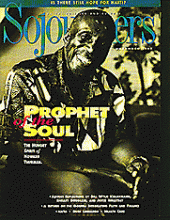Christian groups instinctively sense that God's Word in the Bible stands at the very center of their life together. We know of no faith community that fails to incorporate scripture into its gathering times.
Very often biblical readings entirely shape the community's meeting. The session begins with one or more passages from the Old and New Testaments. The rest of the gathering is a reflection on the texts or a frequent referring back to what was read as other issues are considered.
I once saw a base Christian community do this in a most remarkable way. In a remote part of the Peruvian highlands, a large group of unlettered native folk gathered for their usual weekly Bible study. The text was Jeremiah 17, which speaks of the one who trusts in God being like a tree planted beside the waters, stretching out its roots to the stream. There was a drought afflicting the region at that time and these indigenous families faced crop failure and hunger. How were they to respond to the fertile images of the scripture passage?
After several readings of the text and long periods of silence, one member of the group timidly raised his hand and said, "I think that God's Word calls us today to be fruitful trees for one another. Those who salvage some of their crops will have to share what little they harvest with those who lose everything." I, the foreign missionary, could only add a reverent amen.
Most of our community reflection on the scriptures does not reach that level of profundity or commitment. Still, the constant re-reading and remembrance of the Word nurtures our personal and communal lives as no other exercise or process can.
Read the Full Article

